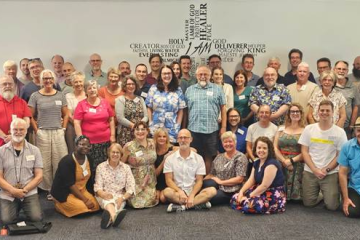Fairly early on in my relationship with Aron I worked out he was a keeper. I don’t mean that he was worth keeping (though that’s definitely true) but that he was someone who kept – who keeps – everything! Everything! He still owns, I think, every pair of socks he has ever owned. He hangs onto every piece of paper that comes into our lives. He has every textbook he has ever studied. And he has, I’ve discovered, every allen keys from every piece of Swedish furniture that we have ever had the pleasure of assembling!
I, on the other hand, am what is called – with great respect I believe – a “chucker outer.” I love to regularly clear things out of our wardrobes, linen closet, kitchen cupboards and filing cabinets. I love a good clean cull!
Though – and I think the inconsistency frustrates the keeper in my life as much as some of his stuff occasionally going missing – I do keep some things. For instance, I have my grandfather’s belt. Dad gave it to me when I needed a black belt, and I still have it. More substantially, I have the dining table and chairs nana was given by her parents when she got married. I have grandma’s watch, on mum’s side, a gift to her from my grandfather. And I have the blanket we found in our first apartment in Japan stolen by the previous international student from Korean airlines. It’s been really handy over the years!
In chapter thirteen of Field Notes for the Wilderness Sarah Bessey talks about deconstructing faith; how many people in their disillusionment or anger or hurt throw out everything they used to believe or do or be part of. And, for many people, this may be a necessary stage. Bessey speaks about her former practice of prayer, a kind of ‘name it and claim it’ approach to prayer, and says, “it look losing prayer altogether for me to have the space to imagine prayer anew”. (Public service announcement! If you have this edition of Bessey’s book you will discover that page 161 is in the wrong place. It makes this chapter a little confusing – almost like you might need field notes for reading the book!)
But she writes, “An evolving faith doesn’t mean we burn down everything that was once precious to us…. There is room to honour and hold space for the precious and meaningful even as we evolve in our beliefs…and our lives. It’s okay to bring some things with you.” And she quotes pastor and theologian A. J. Swobada, “To move forward, we must remember. We don’t jettison the past. We honour, receive it, listen to it. God’s people best move forward into the future by intentionally retrieving the past.”
Or as another wise person who I caught up with this week said, “I don’t think of it as much as ‘deconstructing’ my faith as ‘auditing’ my faith. I am auditing my faith to discover what is truly valuable, what is good fruit that will lead to good fruit.” (I’m paraphrasing here but thank you to that person. It was a great conversation.)
Sarah Bessey goes on to talk about one of those good fruits in her life, her passion for and practice of prayer. (If you would like to read that, I’ve made photocopies – with the pages in the right order – and it’s on the back table.)
But because one of our reflection questions was, “What is something from the ancient or past versions of Christianity that you think is worth preserving?” I thought I’d speak about something else – spiritual reading – an approach to scripture that’s different to Bible study but familiar to anyone who has ever had a verse or a word leap off the pages of scripture and into their life.
Marjorie Thompson, the author of Soul Feast, says spiritual reading is thinking of God’s word; not as this (image of textbooks) – something to be studied – but as this (image of letters) a letter written personally to us. Imagine, she says, “that you have just received a handwritten letter from a dear friend who lives at a great distance and from whom you have not heard in a long while.”
Many of you will have to imagine this because handwritten letters are something of a rarity. But I can remember receiving such letters. Despite being a keen “chucker outer” I have a bundle just like those written to me by a “keeper” who was overseas studying in Japan for a year, and I can recall getting home from work, opening the letter box and the excitement of seeing a pale blue aerogramme! Then making myself a cup of tea and sitting on the back step and, only then, opening the letter and savouring, slowly, as Thompson says, “the words, phrases and images written specifically for me…words that [brought] a sense of [my] friend’s presence vividly into [my] life.”
There is a place for studying scripture, for learning about the history and culture and original languages, for using a variety of critical disciplines to exegete the text. But we also benefit from taking time, as the writer of Colossians says, to let the word of God dwell in us richly, from meeting with God in scripture, and letting God meet with us. We need time for spiritual reading and textual study.
Dietrich Bonhoeffer – who warned young pastors not to substitute sermon preparation for their own spiritual reading – writes, “The Word of Scripture should never stop sounding in your ears and working in you all day long, just like the words of someone you love. And just as you do not analyse the words of someone you love, but accept them as they are said to you, accept the Word of Scripture and ponder it in your heart, as Mary did. That is all. That is meditation.”
Spiritual reading goes back to the Jewish tradition of meditating on Scripture, Psalm 1:1-2; “Happy are those… [whose] delight is in the law of the Lord, and on his law they meditate day and night.” In the Christian tradition, spiritual reading was developed in its classical form by Saint Benedict and referred to as Lectio Divina. In an act of deconstruction, perhaps, many Protestants don’t realise that even figures like Reformer John Calvin or Puritan pastor Richard Baxter “advocated a method of reflective meditation with scripture that is directly derived from Benedictine practice.” While we have navigated these ancient paths
in slightly different ways, Christian people over the centuries have discovered and re-discovered them as a source of life.
So, this morning I want to outline – for some of you again – the classical form of Lectio Divina, in the hope that it continues to enliven our reading of scripture!
Firstly, lectio (Thompson suggests we just add an ‘n’ to demystify these words – lectio is lection meaning reading) where just like reading a letter from a loved one, we slow down and savour every word. “Sometimes,” Thompson writes, “letters from those who love us contain painful words, but they are offered out of love and may be just what we need to hear. The question behind our reading is, God, what are you saying to me just now?”
Secondly, meditatio (meditation) where we sit with a word or a phrase. Where we sit with a word or a phrase that has leapt out at us and tease out its connections with our own life and the great story of God’s redemptive work. This is where we allow words or phrases from the passage to speak into our lives and challenge us.
Thirdly, oratio (oration meaning the spoken word or prayer) where we respond to what we have welcomed or wrestled with in the text. Thompson writes, “Perhaps the Word has touched our pain, and we cry out in hurt, anger or frustration; perhaps God has revealed our sin, and we whisper in confession and repentance; perhaps the Word has evoked gratitude, and our words leap up in thanksgiving; perhaps it has sparked our joy, and we sing out in adoration and praise!”
And finally, contemplatio (contemplation) where we come to a place of rest in God’s presence. Sarah Bessey talks about learning this from her son, who told her once “that he just sits with Jesus sometimes.”
There is a great summary of Lectio Divina from a pastor in the rural south of the US. He says, “I reads myself full (lectio); I thinks myself clear (meditatio); I prays myself hot (oratio) and I lets myself cool (contemplatio).”
That bundle of letters Aron sent all those years ago is now tucked away in storage, gathering dust (which, for some of us, might describe where our Bibles are as well) but I am now engaged in a day to day, vital relationship with the writer of those letters. And this is what spiritual reading invites us to do, to move from a casual acquaintance or brief flirtation with scripture to a day to day, vital relationship. American priest and academic, Barbara Brown Taylor writes, “My relationship with the Bible is not a romance but a marriage, and one I am willing to work on in all the usual ways: by living with the text day in and day out, by listening to it and talking back to it, by making sure I know what is behind the words it speaks to me and being certain I have heard it properly, by refusing to distance myself from the parts of it I do not like or understand, by letting my love for it show up in the everyday acts of my life…”
One place we practice Lectio Divina at CBC is in our weekday morning zoom prayers, where we read a passage, usually twice, and spend time in silence and in prayer together.
This week I was speaking to another Baptist pastor who told me his church had not attended Association meetings for some time because of the division created by enforcing the Position Statements on all churches (sadly, it’s a common story) but he asked, “What has encouraged you and sustained you during this process of being alienated and rejected by the Association?” And I thought for a moment. There’s lots of things: this church; your commitment to a gospel that is for all people, your depth of Baptist conviction; the knowledge we stand with others who have known, even more deeply, alienation and rejection; the joy of being part of the Open Baptists, but… on a day to day basis what encourages me, what sustains me, is spiritual reading – it is gathering each weekday with a group of people to hear God speak to us.
From time to time – helpfully – the link to Morning Prayers is in our bulletin, you can find it in the 23 Feb or 2 March bulletin, but I am very happy to share that with you.
And there are also many other resources people can use for spiritual reading or for Bible study. As well as many other traditions and practices, beliefs or spiritual disciplines we can bring from the past, to continue to nurture and challenge and sustain our faith into the future.
Jeremiah 6:16: Thus says the Lord: Stand at the crossroads and look, and ask for the ancient paths, where the good way lies; and walk in it, and find rest for your souls.
Let us continue to find and walk this good way.


